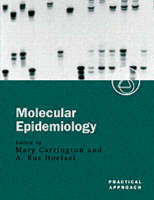
Molecular Epidemiology
Seiten
2001
Oxford University Press (Verlag)
978-0-19-963810-9 (ISBN)
Oxford University Press (Verlag)
978-0-19-963810-9 (ISBN)
- Titel ist leider vergriffen;
keine Neuauflage - Artikel merken
Molecular epidemiology uses many different molecular techniques to determine the genetic basis for susceptibility or resistance to infectious pathogens. The sequencing of the human genome means it is a rapidly growing field. This PAS book covers all the major molecular techniques and statistical methods of data analysis.
The 'molecular' aspect of molecular epidemiology refers to the application of molecular biological approaches to epidemiologic problems. The variety and power of molecular methods are rapidly expanding our capability to dissect etiologic mechanisms of disease. The 'epidemiologic' aspect, meanwhile, refers to utilizing the tools and perspectives of epidemiology to comprehend observations in molecular biology. An increasingly sophisticated variety of molecular
techniques are being applied to generate an explosion of data on exposures and outcomes whose significance must be determined.
The wealth of information generated by the Human Genome Project and the corresponding efforts in microbial genomics are providing researchers with extraordinary new opportunities to further understand the etiology of disease. Molecular epidemiology is rapidly evolving through the application of more relevant markers of exposure and better identification of subgroups at increased risk of early disease processes and progression.
This volume provides a broad overview of the diverse approaches encompassed by this emerging discipline. Chapters 1-3 highlight concepts and methods at the forefront of studies of infectious diseases, and include a synopsis of general epidemiologic design and analysis, as well as current techniques for molecular typing of microbial pathogens. Chapters 4-6 are focussed on recent advances in studying host genetics, including methods for the detection of mutations and polymorphisms,
identification of linkage among alleles of genes on a given chromosome, and the use of DNA pooling to increase efficiency in association studies of genetically complex traits. Chapters 7 and 8 deal with the relationship between pathologies and immune system genetics, and on the use of DNA sequence information to
garner insights into the evolution of infectious pathogens, and into the evolution and function of the immune system.
The 'molecular' aspect of molecular epidemiology refers to the application of molecular biological approaches to epidemiologic problems. The variety and power of molecular methods are rapidly expanding our capability to dissect etiologic mechanisms of disease. The 'epidemiologic' aspect, meanwhile, refers to utilizing the tools and perspectives of epidemiology to comprehend observations in molecular biology. An increasingly sophisticated variety of molecular
techniques are being applied to generate an explosion of data on exposures and outcomes whose significance must be determined.
The wealth of information generated by the Human Genome Project and the corresponding efforts in microbial genomics are providing researchers with extraordinary new opportunities to further understand the etiology of disease. Molecular epidemiology is rapidly evolving through the application of more relevant markers of exposure and better identification of subgroups at increased risk of early disease processes and progression.
This volume provides a broad overview of the diverse approaches encompassed by this emerging discipline. Chapters 1-3 highlight concepts and methods at the forefront of studies of infectious diseases, and include a synopsis of general epidemiologic design and analysis, as well as current techniques for molecular typing of microbial pathogens. Chapters 4-6 are focussed on recent advances in studying host genetics, including methods for the detection of mutations and polymorphisms,
identification of linkage among alleles of genes on a given chromosome, and the use of DNA pooling to increase efficiency in association studies of genetically complex traits. Chapters 7 and 8 deal with the relationship between pathologies and immune system genetics, and on the use of DNA sequence information to
garner insights into the evolution of infectious pathogens, and into the evolution and function of the immune system.
Introduction ; 1. Epidemiological methods for studies of genetic factors that influence infectious diseases ; 2. Molecular Differentiation of bacterial strains ; 3. Detection and quantification of heterogeneous viral targets: using HIV as a model ; 4. Mutation Detection by Single-Stranded Conformation Polymorphism and Denaturing High Performance Liquid Chromatography ; 5. DNA Pooling Methods for association mapping of complex disease loci ; 6. Single-sperm typing: a rapid alternative to family based linkage analysis ; 7. PCR-based methods of HLA typing ; 8. Evolutionary Analysis of Molecular Sequence Data
| Reihe/Serie | Practical Approach Series ; 251 |
|---|---|
| Zusatzinfo | numerous tables, figures and 5 half tones |
| Verlagsort | Oxford |
| Sprache | englisch |
| Maße | 189 x 246 mm |
| Gewicht | 601 g |
| Themenwelt | Medizin / Pharmazie ► Medizinische Fachgebiete ► Mikrobiologie / Infektologie / Reisemedizin |
| Studium ► Querschnittsbereiche ► Epidemiologie / Med. Biometrie | |
| Naturwissenschaften ► Biologie ► Genetik / Molekularbiologie | |
| ISBN-10 | 0-19-963810-1 / 0199638101 |
| ISBN-13 | 978-0-19-963810-9 / 9780199638109 |
| Zustand | Neuware |
| Informationen gemäß Produktsicherheitsverordnung (GPSR) | |
| Haben Sie eine Frage zum Produkt? |
Mehr entdecken
aus dem Bereich
aus dem Bereich
Health Information for International Travel
Buch | Softcover (2025)
Oxford University Press Inc (Verlag)
CHF 85,50
Buch | Teilwerk (Buch) (2024)
Oxford University Press (Verlag)
CHF 57,60


